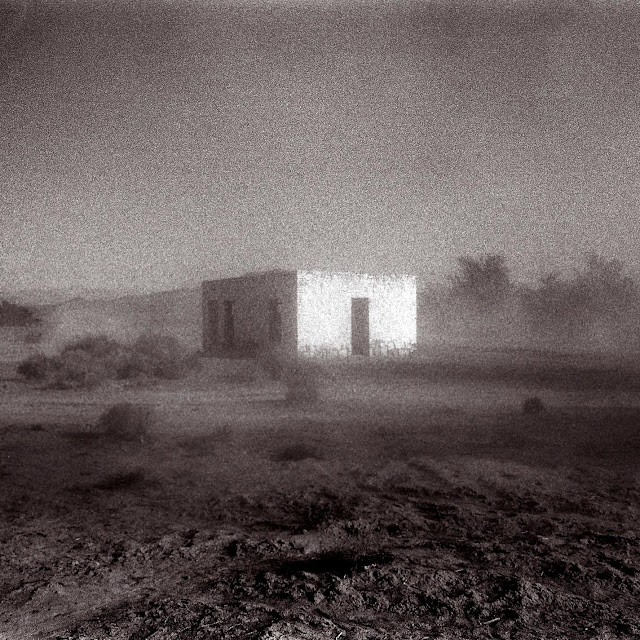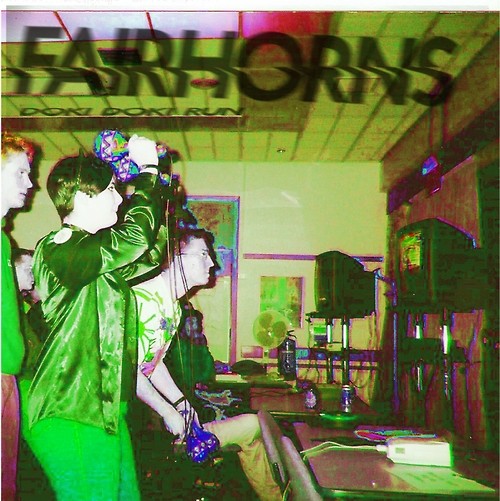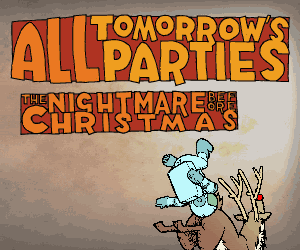
"I love a lot of music that gets counted as pop, and also lots that isn't. I think it can be more potent and with it interesting to use a familiar world (here being pop music) to express something because you've instantly got people's ears through particular channels – radio stations, music publications... It's a common language. I reckon it's much harder to reach a wide audience doing experimental theatre." Whilst both records may be rooted in tendencies pop, rather aptly Furniture is a considerably more – for want of a better past participle – polished affair: there are more layers to the monumental climax of What Am I To Do, for instance, than there are to the most vertiginous of Sketty wedding cakes. Similarly, said song and beyond may be regarded as both experimental and overtly histrionic, and it's this element of the restrainedly overblown which may be deemed a disparity between albums #1 and #2. Insinuated yet never quite achieved on the début, to paraphrase U-Mass, it's evolutional. And purposefully so.
"Goodbye Falkenberg was a mishmash of all the new music we were discovering at the time: we'd be finding new records every week and falling in love with them, then writing songs under that influence. We really hated that thing of edgy bands' first records that were, like, them in a room playing 10 of their best songs, and consequently wanted to do something really collaged and textured. With Furniture though it was about being as direct as possible, recording fast with few chords; just sung melody, rhythm and words. We wanted it as basic, yet basically as original as possible. Completely instinctive; not too much thinking." Mission accomplished then? "The finished result is as I wanted it to sound, but the way we got to that point was often unplanned and surprising."
So these new songs; this new setup in personnel; the heavily tweaked stylistic direction: what prompted it all? "We always change; it was all gradual. But there was a definite feeling of reaching breaking point: out with the old; in with the new. We were bored of music as it was, so naturally rebelled against what we had been doing previously, as well as the things that we hated that were and indeed still are going on in music. We didn't want to hide, and try to fit into what a band should now sound like." No matter how your archetypal 2k12 indie band may sound, chances are that unless you're already backing Race Horses in such stakes Furniture will remake/ remodel your circumspect act. Jones continues: "I stopped thinking of us as a band, and more as a group. As such, the record needed to sound a certain way in order that it fit with the words and that was always my motivation." That said, the genre to define popular culture remains fundamental: "We have used pop as a vehicle, yes" Jones contends. It's the sort of riposte that makes you wish you were sat down face to face with the gloriously fringed melody maker just to gauge how he feels to such inevitable designation.
Alas, we're conversing somewhat emotionlessly via email.
Nonetheless, succouring Jones rather more personally in this reconstruction and the general reconfiguration of music to words and vice versa are new recruits Daniel Bradley (who bashed in "bits of percussion and helped with the change in sound") and Mali Llywelyn ("she's incredible at playing everything", Jones heartwarmingly gushes) and although the primary motive for their inclusion lies in the facilitating of a full and steadfast live retranslation of the record, their involvement oughtn't go underestimated. Such is its richness both texturally and, again, impressionistically.
However how does Jones' impression of the dichotomy between temporary relevance and enduring longevity weigh in? With it becoming increasingly taxing for any band to instal itself as part of the Furniture of British music as it were, and with every attention span dwindling; withering under the incomprehensible amounts of listenable thing out there in the big, Wide Web World the lyrical lynchpin to its eponymous opener, "We are furniture!" sounds staunchly defiant...
"I can't imagine anything worse than being considered 'part of the furniture of British music'. And this record is about the opposite of that: the frustration and pain that people feel from having to fit in – to behaving in a certain way." The dogged snarl of the underdog perhaps, but Jones' outlook feels considerably more enduring than most musics spunked out online. "I don't care if our music lasts for a long time or not. This is a record for now, about now (for us) and it might be completely irrelevant in the future. The future is a different place and no-one knows how it will be. I think this mentality of bands thinking about their career, the impact of their music and so on is why music is so safe and uninspiring at the moment. Too many people are thinking about what they should do, how they should sound and will compromise in order to be successful, rather than starting from scratch and thinking... I could make anything."
Of course this ability to record and self-release anything is doubtless one of the many merits of the internet. Since its inception and subsequent, figurative nuclear mushrooming its viral infestations have, however, become increasingly capable of escaping onscreen ensnarement. It's even begun to encroach upon the live experience: you can't move for iPhones, iPads and other iNessential gadgetry at London shows these days although no matter how spiffing that Instagram snap you took last time you staggered into the back room of the Shacklewell, rest assured Jones shan't ever see the thing: "I really dislike social media", he hisses (or so I fancifully imagine). "There really is no depth to it, and I always get to feeling pretty depressed if I spend time on Twitter. But that's personal."
Thus with the internet beginning to be furnished with reviews of his latest oeuvre, will he really read nothing on the subject? "For us making things of worth is important – like writing records or playing concerts – and if people enjoy discussing that or other things online, that's completely cool. I can see as well that it's a beneficial way to share music, and it's a good avenue for all kinds of people to get into new things. It's been really lovely to read people's reviews and comments on the album – and it's great that people can freely publish their ideas on the web. I'm all for that."
And much of that already writ refers back to the old pop epithet: "The great thing about pop music is that it's not exclusive, and hasn't that snobbery attached to it. But pop to me is pointless unless it's subversive." Jones would appear not only precise in his evaluation of pop music and what it may constitute or be considered, but also practised. And it's this pop sensibility; this sensitivity almost for the pushing of the preconception of what may be construed as pop which defines this endangered breed of a band. Moreover it's this which ensures the transition from Goodbye Falkenberg through Furniture feels smooth, and natural, and above all almost Darwinist. Yet both feel incongruous with other records around both now and then. Or then and now; either way.
"We're really not retro-heads at all; I'm not really into records nor clothes from one particular era. We like some modern music – I love Micachu – although I think generally, in terms of pop music at least, that things were a lot less inhibited from the '50s through to the '80s than they are now and so a lot of older music feels freer in that respect. Most modern music I hear seems to sound quite self-conscious, like it's trying to sound like something, or someone, or the repetition of a formula. I guess around the time we recorded Furniture we were discovering a lot of great records, many of which seemed to have been recorded between '79-'82. Stuff like the Associates. But we always need new stimulation, and will naturally move away from what we have just explored having done so. I think..."
As much as music may change, one thing to remain forever resolute is Jones' nationality and as you may have gleaned from certain above elements of this interview, he hails from the Land of My Fathers. Or rather my mother. But how has Welsh heritage affected both he and they musically? "I guess you can't help but be influenced by your environment – whether it influences you and what you do, or whether you rebel against and reject it. And I think it's a case of a bit of both for me: I love some things from/ about Wales and hate a lot of others. I think growing up fairly rurally gave us quite a lot of musical freedom, and that's about the most important thing I've got from it I think."
The latest track to be pulled from the drawers of Furniture, however, is entitled My Year Abroad. Jones here yelps of "the sinful lights of Tokyo" and the feel of the thing is, as intended, "completely urban in its feeling, words and atmosphere. It's the feeling of a city." And a stunning, yet supremely overwhelming one it is too. Just like the in every way unknowable Japanese capital then. "At the time I was, and had been living in London for years with Dylan [Hughes, synths/ keys/ etc.] and Gwion [Llewelyn, guitars/ bass/ synths/ etc.] down in Cardiff so I would say that there was very little thought for either mountains or sea. That particular one's born of the claustrophobia and distortion of city life at night."
And finally if there's one thing London boasts in greater abundance than it does dusted, forgotten vinyl it's apartmental abode. Most of which will be furnished with some concertedly chipped and weathered coffee table most probably. Were Furniture said coffee table therefore, what listening guide or accompaniment otherwise would be found sat atop the thing? "For starters it wouldn't be a coffee table. But if it had to be, the accompanying book would be D.H. Lawrence's Lady Chatterley's Lover." And if 'body without mind' be deemed 'brutish' then in Furniture the evidently active mind of Meilyr Jones has a body of work in which it may thrive.
Furniture is expected September 10th via Stolen Recordings / [PIAS]. The band play both Rough Trade East and The Lexington next month.























